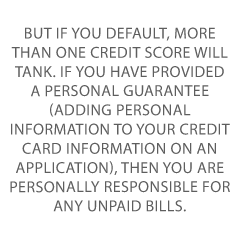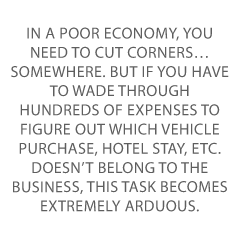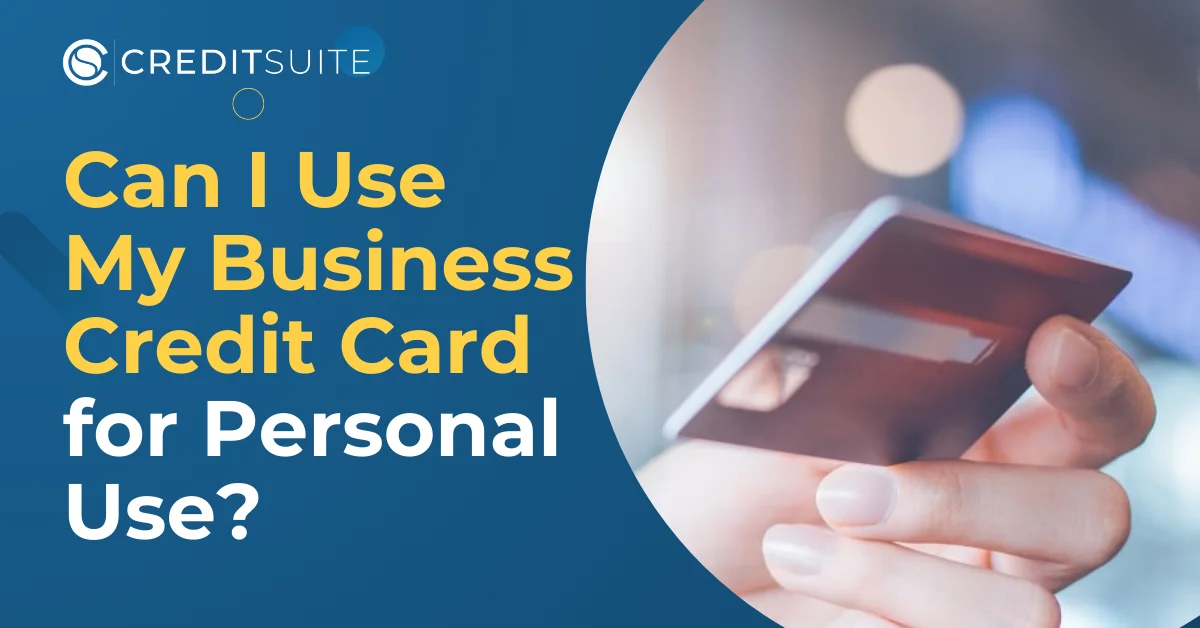Well, IS it illegal to use a business credit card for personal use? No. Is it a good idea? Also no. Can it lead to problems down the road? Yes. Is it smart? Probably not.
But the credit card issuer won’t call the authorities and no one will arrest you.
Is It Illegal to Use a Business Credit Card for Personal Use?
If you want to get technical about it, no. However, it’s possible that you’re violating the T & C of your business credit card agreement. And, this kind of misuse makes it easier to commingle funds—which is something the IRS definitely doesn’t want you doing.
So, don’t do it.
All that being said, a small personal use slips up here or there is not preferred but not too bad. The real problem happens if small business owners or employees commit credit card fraud.
In particular, not checking charged personal expenses carefully can add up to some very costly mistakes.
Even the best business credit card isn’t meant for your personal expenses. Business credit cards are essentially a form of business finance, like a business loan. Company funds are meant for the running of your business.
They are not meant to be an enhancement of your personal finance. They are for business purposes, not for your personal purposes. Rather, they are for the payment of your business expenses alone.
Small business owners should resist any temptation to take out a cash advance on a business credit card and use it for personal expenses. The downsides are multiple.
Downsides of Using Business Credit Cards as Personal
Apart from it just plain being wrong, and not being the best credit card you can use, there are specific disadvantages to misusing business credit cards.
Downside 1 – You Open Yourself Up For Personal Liability
Corporations are good protection for a business owner. But if there is a fuzzy line between business and personal expenses, a court could allow for a ‘piercing of the corporate veil’.
As a result, you can be held personally liable for your business’s actions. If your business becomes embroiled in a wrongful death lawsuit, a verdict or settlement can easily hit $1 million.
An unpierced corporate veil means your personal assets are protected. But a hole in that veil means you are on the hook, at least in part. Keep the lines clear and sharp by not using your business card for personal expenses. Use a personal card instead.
Downside 2 – You Will Lose Consumer Protections
Business credit card issuers like Capital One are under no obligation to abide by consumer protection laws. Due to this lack of protection, you can find yourself with interest rate increases on your existing balances. In fact, interest rates could be changed without notice.
If you pay your debt on time, a lack of consumer protection means you can still be charged interest. And your credit card payments won’t be applied to your highest interest rate charges first. You will have to dispute any errors more quickly.
And if you really don’t pay, you will have fewer protections against how a collection agency might opt to collect the debt. That’s not the case when you use a personal card.
Downside 3 – You Can Harm Both Your Personal and Business Credit Score
 If you pay on time, your business credit score will rise. But not your personal credit score—because your business credit card likely only reports to a business credit bureau.
If you pay on time, your business credit score will rise. But not your personal credit score—because your business credit card likely only reports to a business credit bureau.
But if you default, more than one credit score will tank. If you have provided a personal guarantee (adding personal information to your credit card information on an application), then you are personally responsible for any unpaid bills.
And, in turn, your personal credit will suffer from any non-payment.
One way around this is if you can find and get approved for business credit cards that do not require a personal guarantee. But it’s not always easy to find business credit cards with EIN only.
Downside 4 – Congratulations, You’ve Just Made it Harder to Properly Track Your Business Expenses
Properly tracking your business expenses isn’t just good for the health of your business. It’s also what most business lenders want to see. A messy set of books is the antithesis of that.
And, a lender will most likely want you to clean your books up anyway before you can see a dime.
Keeping expenses separated goes a long way toward understanding where your business is doing well, and where it may be losing money.
In a poor economy, you need to cut corners… somewhere. But if you have to wade through hundreds of expenses to figure out which vehicle purchase, hotel stay, etc. don’t belong to the business, this task becomes extremely arduous.
Downside 5 – You Have Made it Harder to Do Your Business Taxes
Personal expenses tend to not be tax-deductible, whereas business expenses are. But how can you tell the difference if everything is mixed up? If you hire an accountant to prepare your taxes, you’ve added time to their work. And you’ll be billed for that.
If you accidentally declare a personal expense as a business expense, it will show up in an IRS audit. You can be hit with fines and penalties.
Once you’ve been audited once, the IRS has you and your sloppy accounts books on its radar. A tax audit is never any fun. Now imagine going through one every year, for both personal and business taxes.
Downside 6 – It Will Cost You More, Anyway
Business credit cards often have higher fees and higher interest rates. But the trade-off for higher rates is that most interest and fees for business purchases are tax deductible. This is along with the business expenses themselves.
But a personal purchase is not tax-deductible. This means you will get no return on them. As a result, if you make any personal credit card purchase with your business credit cards and maintain a balance, these credit cards will cost you more in the long run.
And don’t forget, your interest rates can be raised at any time, and with no notice to you.
Downside 7 – Your Business Card Could be Canceled
Your business card agreement no doubt includes a clause that says you promise not to use your card for personal matters. By doing so, you have just violated your company credit card agreement. This broken promise is grounds for a card issuer to close your account.
If your expenses look like they are personal, a credit card company will take note of that. A continual pattern will send up red flags.
It can be hard enough to get business credit cards. Do you want to lose one of yours? Because this is how you lose a business card.
Are There any Upsides to Putting Your Personal Expenses on a Business Card?
There’s no denying that there are a few.
Putting personal expenses on business credit cards will help your personal credit card utilization rate. If you make large expenditures against your credit limit, then this could help prop up your personal credit score. You might be able to avoid a balance transfer and its fees.
Utilization accounts for 30% of an Experian personal card score.
It can keep your amounts owed lower, mainly because the amount of credit you’re using won’t show up on your personal credit report. It can also potentially reduce any new credit in your score if you use a business credit card rather than get a new personal credit card.
But new credit only accounts for 10% of an Experian personal credit card score.
However, you won’t enjoy any improvement in your personal credit card payment history (35% of an Experian personal score) or credit mix (10%). It also will not help with your credit history length (15%).
If you pay balances off each month, more charges on your credit card can translate into more points and rewards. Many credit cards offer bonus rewards if you charge a certain amount within a certain time period. More charges mean you’re more likely to meet the threshold for rewards.
Can I Use my Business Debit Card for Personal Use?
This is similar to using a small business credit card for personal use. Unless it is actual, provable fraud or embezzlement, you won’t end up in the criminal justice system. A bank or ATM or store won’t care if you’re using a business debit card this way.
They just don’t want to lose money.
But since business debit cards are often the kind issued to employees, your boss will probably take exception to this use of company money.
Employers use records from each credit card transaction to determine expense totals, what they can deduct from taxes, etc. If your personal expenses are on a statement, then they will see them.
Your employer will want a payback (almost like a statement credit) from you. This will most likely include any incurred overdraft fees. Since overdraft and other fees can be higher with business bank accounts, you have incurred even more of an expense.
But even if you are a small business owner, this behavior still causes the issues listed above. You can hurt business and personal credit. There might be an issue of liability—certainly the loss of consumer protection.
You also raise your expenses while making it harder to do your books and pay your taxes.
Oh, and your account can be canceled.
Takeaways
No one will knock on your door in the dead of the night to arrest you for using a business credit card for personal expenses.
But you will be doing your business and your personal credit a few favors if any. Contact us today to learn legitimate ways to use your business credit and build it.

